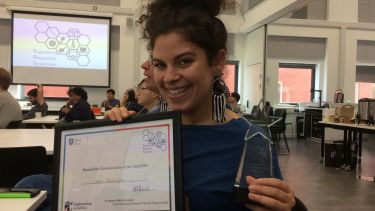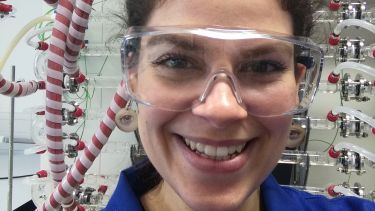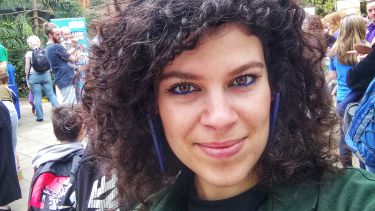I didn’t choose Sheffield, it chose me. But like the sorting hat in Harry Potter, it was a choice well made!

Read: Our interview with Eleni
What motivated you to be an engineer?
Both my parents are from a STEM background, mostly around chemical engineering, automation, chemistry, and lab management. Inevitably, I grew up in an environment that promoted STEM as an option for both sexes, so I never thought “I cannot be this or that”. My mum is an excellent cook and baker, and it was our “thing”, for her to cook and me to help out. From a very young age I remember her explaining food chemistry secrets such as how cakes and bread rise while baking; why does baked bread smells so good; why eggs solidify upon cooking; and how acidic marinade makes meat tender.
I was very interested in chemistry but I wanted to study something else with this subject, hence chemical engineering became an option, especially after I found that food engineering was an option to be pursued with such a degree. I got into university to study chemical engineering, loved the food and biotech related topics, and I loved the problem-solving focused engineering mindset I developed during my undergrad.
Although there was never an issue of me studying an engineering degree, I was not aware of the uncountable shades of engineering and engineers, meaning that I started as someone looking up to their parents, only to realise that becoming an “engineer” is not something set; you engineer your own way and your own title. There is such a variety of engineering sectors, degrees, sub-categories, courses, experiences, that at the end of the day two engineers will not be the same.
Why did you choose the University of Sheffield to do your PhD?
I didn’t choose it, it chose me! But like the sorting hat in Harry Potter, it was a choice well made! I came to Sheffield for my PhD, after finishing my MSc in Glasgow. I was supposed to start my PhD there, but I chose to follow my supervisor to the Department of Chemical and Biological Engineering at the University of Sheffield (TUoS) at the time.
Within the first year of my PhD I knew that TUoS was a great choice, and a really fantastic opportunity for me! I liked that the Faculty of Engineering was clustered together in a big conglomerate that facilitated interdisciplinary collaboration. I liked that campus was a short walk from the city centre, making it perfectly located for a quick break (or two) during the day. I loved the development of the Faculty of Engineering buildings mixing old-school with futuristic.
I loved the opportunities for extra-curricular activities that took my PhD experience to the next level and helped me grow skills I never thought I would. In particular, I enjoyed being involved with teaching at the Diamond facility and seeing how staff there approached the education of aspiring engineers. And I definitely loved the vibe of the staff I came across, always happy to help, chat, smile, and make me want to stick around!
The city of Sheffield definitely grew on me over the years. What I initially thought of as too small and blunt, turned to be a great, vibrant city, expanded across several neighbourhoods with distinct character. Plus, I realised that Sheffield is close to everywhere, both big cities and spectacular nature.
What’s been the highlight of your engineering journey so far?
What has startled me so far is the multidisciplinarity of engineering, and the ease to collaborate with different disciplines under the engineering umbrella. A personal highlight would have to be gaining my PhD title in an area of chemical engineering on the interface of materials science and biotechnology I knew nothing about, while gaining experience in all sorts of other, non-engineering-related activities.
What are your ambitions for the future?
I would love to help pave a world where young girls can dream of being engineers as easily as dreaming of being princesses (yes, I might have worn a cape and pretended I was Royal…). Realistically, I want to engage with training of people, make them realise their knowledge and skills, and how a degree in STEM can open several career outlays. I love science and engineering, and I love learning and talking about scientific and engineering advancements. Ideally, I would want to work in (or create) a job that allows me to stay in touch with the wider sector of STEM while engaging with people through creative outlays!
What’s the best thing about being an engineer?
The ability to rationalise through problems and engineer a solution, the analytical skills, and the ability to quickly grasp or gauge information.
We interviewed Eleni in 2020.



